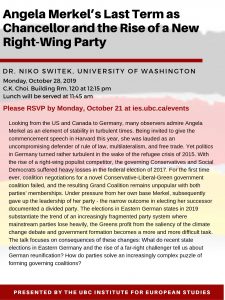
October 28, 2019
12:15-1:45pm
C.K. Choi Building Rm. 120
Niko Switek, University of Washington
“Angela Merkel’s Last Term as Chancellor and the Rise of a New Right-Wing Party”
Abstract – Looking from the US and Canada to Germany many observers admire Angela Merkel as an element of stability in turbulent times. Being invited to give the commencement speech in Harvard this year she was lauded as an uncompromising defender of rule of law, multilateralism and free trade.
Yet politics in Germany turned rather turbulent themselves in the wake of the refugee crisis in 2015. A right-wing populist competitor arose and the governing conservatives and social democrats suffered heavy losses in the federal election 2017. For the first time ever coalition negotiations – about a novel conservative-liberal-green federal government – failed, and the resulting remake of a grand coalition was unpopular with both party’s memberships. Under pressure from her own base Merkel subsequently gave up leadership of her party – the narrow outcome in electing her successor documented a divided party. The elections in Eastern German states in 2019 substantiate the trend of an increasingly fragmented party system, where the established parties lose heavily, the greens profit from the saliency of climate change debates and government formation becomes a more and more difficult task.
The talk focuses on consequences of these changes: What do recent state elections in Eastern Germany and the rise of a far-right challenger tell us about German reunification? How do parties solve an increasingly complex puzzle of forming governing coalitions?
Bio – Dr. Niko Switek received his Ph.D. in Political Science in 2015 from the University of Duisburg Essen (Germany) and is currently DAAD Visiting Assistant Professor for German Studies at the Henry M. Jackson School for International Studies and the Department of Political Science at the University of Washington. His research focuses on political parties and party systems as well as on coalition politics. He wrote extensively about the German green party ‘Bündnis 90/Die Grünen’ and the green party family in Western Europe. In addition he worked on parties on European level (‘Europarties’) and just recently compiled a volume on fictional TV series about politics.